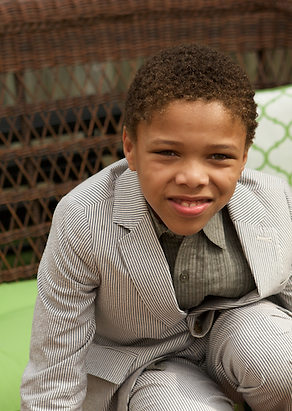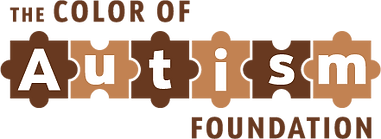
The Color of Autism
Interview with Camille Proctor: Founder and Executive Director
March 31, 2021 ・ 3 min



Q: What is the Color of Autism Foundation? Provide a brief overview.
A: “The Color of Autism Foundation is a 501(c)(3) that focuses on building efficacy within underserved communities. Typically, when you think of underserved communities, it’s mostly communities of color - individuals who don’t have the same access, that their white counterparts would have, to services, information, etc. We serve as the connecting thread to those things. We provide training, support groups, and wraparound services, so families can be their child’s first and best advocate.”
Q: Unfortunately, receiving a medical diagnosis can be tricky (especially for the African-American community). Explain why this is the case and how it affects people across the country.
A: “So… it’s a combination of things. First, there’s an access problem. Then, there’s an equity problem as well. Information isn’t always equitable in the United States. Some populations may be inundated with information - “this is what you look for and these are the signs” - where others are left out. Then, of course, you have families that are typically in denial because of the lack of the first two things. They don’t realize that autism affects everyone. It’s not only young white kids that have autism. Every population has autistic people among them. So, that’s one of the reasons why there is a delay in the diagnosis. Some parents just don’t know what to look for. They don’t realize that autism is not something that will just go away. They don’t know what to do!”
Q: What are the effects of law enforcement & the criminal justice system on people with autism?
A: “When I started the Color of Autism Foundation, my son, Ari, was 3 years old. But I found out that he was autistic when he was 2. One of the main problems is that... I would go to support groups and talk about things that are unique to the African-American community. I would ask people, “what’s going to happen when Ari is 13 years old, 6 feet tall, and doesn’t know how to communicate? If he doesn’t know how to yield, and a cop approaches him, then he could get arrested, hurt, or worse.” Everybody would look at me like I was a Debbie Downer, but I would say, “you don’t understand that, in my particular community, some children are not given the same luxuries as others.” Meaning that they only have about 3 good years of cuteness. No one really understood that.
Elijah McClain was just walking and minding his own business. He was autistic. I don’t think there is a single person who has a family member on the autism spectrum that didn’t know this - especially after listening to the audio of him begging for his life. So, it’s very important to… I don’t even want to say “train the police” because I think we’re beyond that point… but I think that we need to get members of the autism community and police officers in the same space, so they can learn about each other - instead of giving people donuts, coffee, and a two hour presentation about what autism is.
The Color of Autism Foundation has a one-on-one program, where we partner autistic individuals and police officers together. In this way, they get to learn about each other organically. So there is not a mythical autistic person that’s out roaming around. When the police officers come across an autistic person, they can say, “oh, that’s Danny! I remember him from the class and he did this...” So it makes them less aggressive toward autistics. At least, that’s what our goal is. We hope that the relationships and outcomes become better. I never want to hear another story like the one for Elijah McClain. It was truly heartbreaking for a lot of people.”
Q: What challenges have you faced as an autism advocate?
A: “I started the Color of Autism Foundation in 2009, in Georgia - because that’s where I lived at the time. Then, I moved to Michigan about 8 years ago and continued the work. Not many people know that we are located here because of a larger organization that’s inundated all over the place. But, this organization doesn't actually help underserved communities. It’s not really helpful if you provide services that people can’t access, or if you don’t reach out to the community and have people that are represented. That is one of the things I really like about the Friendship Circle (for example), because it’s a community within a community. They also reach out to others to become part of that community. And that’s what our goal is. We want to be centralized in a place that our families can actually reach and be supported. So, that has been a struggle. Many people say that Detroit has a lot of great autism organizations, but do you really think that a billboard of a giant white baby is calling to the inner city?? Many places don’t even have advertising that looks like the families! So, that’s the biggest hurdle - explaining to people that I’m here!"
Q: Where do you hope to go with your career in the future?
A: “We are a national organization. Our training sessions are virtual, and they will probably remain virtual because, across the country, there are "service deserts." For example, here in Michigan, our services are okay. But, if you visit a state like New York, they have a "cafeteria of services." In California, even better. We are working towards getting a stand-alone building, so we can provide living and efficacy skills. We want parents to focus on their child and what their child wants, and embrace the fact that their child is an autistic person. So, the best thing that you can do is support them and work on things that are important to them. For example, my son is 15 years old. When he was diagnosed with autism, I had to realize that it’s not about me, it’s about him! So now, I confer with him about stuff. Sometimes, his answers are ridiculous because he’s a teenager. But, at least he has input in his life and that is important. We want to be able to provide services like job training, and continue on with the support! We don't really have huge, lofty goals, because I think that what is necessary to support families is really simple: information.”
Q: How does the autism stigma affect you personally?
A: “Well… my son hated going to the grocery store. He only liked visiting Target, because every store is the same. I remember people saying, “ugh, get him out of here! Ugh, he needs a spanking!” So, those experiences weren’t very nice. Sometimes, parents get embarrassed because their child stims. But stimming is just a way for them to self-regulate. So, as long as the stimming isn’t self-injurious, I don’t care! My son can flap to his heart’s content. It doesn’t matter! And if you’re looking at him strangely, then maybe you need to flap!”
Q: What can students and parents do to help? How can we spread the word?
A: “The best thing that students can do to help is become a part of the autistic community. Befriend someone! Get to know them. Don’t think that because they have neurodiversity, they are going to be polar opposite of you. That is just one factor of who they are! There are so many other things. So, I think that if more people took the time to build bonds, then we would have better outcomes with those individuals. It would also lessen the isolation they feel. I don’t think anyone should feel like they are on an island, when they have a bunch of people around them. So, that’s the best advice I could give to someone like you. Keep volunteering! Keep engaging with these individuals! And become a real friend to them. Not just for school credits!”
Q: What is your #1 worry/fear as a parent? (ex. independent living, job skills, transition to adulthood)
A: “Ari doesn’t process very well. He’s not nonverbal, but sometimes you don’t understand what he’s saying. So, I worry about him processing and understanding information. Will he live independently? I don’t really know what the future holds. We are trying to figure out what he can do. We are working on creating a legacy for him. So, those are some of my worries.”
Q: Is there any additional information you would like to share about you, your work, or other personal experiences that would be helpful for me to know?
A: “Ari likes to travel! He participates in the Bloomfield SCAMP program every year, and he loves it!”
Interviewed By Cooper Bond
Visit the Color of Autism website:






